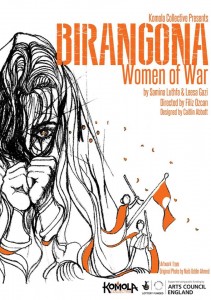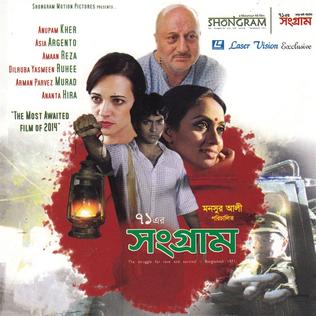 W
WOn 5 February 2013, protests began in Shahbag, Bangladesh following demands for capital punishment for Abdul Quader Mollah, who had been sentenced to life imprisonment, and convicted on five of six counts of war crimes by the International Crimes Tribunal of Bangladesh. Later demands included banning the Bangladesh Jamaat-e-Islami party from politics including election and a boycott of institutions supporting the party.
 W
WAparajeyo Bangla is one of the most well known sculptures dedicated to the Bangladesh Liberation War in 1971. It is located in the campus of Dhaka University, just in front of the Faculty of Arts Building. In Bengali, the phrase means "Unvanquished Bengal".
 W
WThere has been numerous works of art that depicted the Bangladesh Liberation War during and since the War both at Bangladesh and abroad. The concert for Bangladesh organized by members of the Beatles was a major happening in 1971 for protest music. The songs recorded for and broadcast on Swadhin Bangla Betar Kendra are still considered to be the best of Bangladeshi protest songs.
 W
WBangladesh Police Liberation War Museum is a museum that commemorates the contribution of Bangladesh Police to the Bangladesh Liberation War. It is located at Rajarbagh Police Lines on 1.5 bighas of land area and was established on 24 March 2013. It contains various materials and symbols which denote the sacrifice of police soldiers during the war. The museum's research unit identified a police officer killed in British Council premises during the Bangladesh Liberation war. Habibur Rahman is the founder and President of Bangladesh Police Liberation War Museum
 W
WThe Bir Sreshtho, is the highest military award of Bangladesh. It was awarded to seven freedom fighters who showed utmost bravery and died in action for their nation. They are considered martyrs.
 W
WBirangona: Women of War is a British one-act play by Leesa Gazi about the untold true stories of female survivors and sufferers, Birangona, of the Bangladesh Liberation War, during which over 200,000 women were raped and tortured. The theatrical production is dedicated to narrating the stories of war heroines from their perspective.
 W
WDead Reckoning: Memories of the 1971 Bangladesh War is a controversial book on the Bangladesh Liberation War written by Sarmila Bose. The book has been accused of flawed and biased methodology, historical negationism and downplaying war crimes.
 W
WThe Hamoodur Rahman Commission, was a judicial inquiry commission that assessed Pakistan's political–military involvement in East-Pakistan from 1947 to 1971. The commission was set up on 26 December 1971 by the Government of Pakistan and chaired under Chief Justice Hamoodur Rahman.
 W
WThe International Crimes Tribunal (Bangladesh) is a domestic war crimes tribunal in Bangladesh set up in 2009 to investigate and prosecute suspects for the genocide committed in 1971 by the Pakistan Army and their local collaborators, Razakars, Al-Badr and Al-Shams during the Bangladesh Liberation War. During the 2008 general election, the Awami League (AL) pledged to try war criminals. The government set up the tribunal after the Awami League won the general election in December 2008 with a more than two-thirds majority in parliament.
 W
WThe International Crimes Tribunal (ICT) is an ongoing tribunal in Bangladesh that aims to investigate and administer justice regarding the war crimes, crimes against humanity, genocide and crimes against peace committed by Pakistan army and their local collaborators Razakar, Al-Badr, Al-Shams during the Bangladesh Liberation War of 1971. In 2008's public election, one of the principal electoral manifesto of the Awami League was to initiate the trial process of war criminals. As promised, a member of parliament from Awami League submitted the proposal of the trial of war criminals on 29 January 2009 in National Parliament and the proposal was accepted unanimously. Finally after 39 years of Liberation of Bangladesh, on 25 March, the tribunal, attorney panel and investigation organization was formed for the trial of the ones accused of war crimes.
 W
WJalladkhana Killing Field is located in Avenue 1, Mirpur, Dhaka. It is a mass grave from the Bangladesh Liberation war. During the war, muhajir people mostly supported the Pakistani army The muhajir population were in a large number in Mirpur during that time, as a result they have killed a large number of people from Mirpur.
 W
WThe Liberation War Museum is a museum at Agargaon in Dhaka, the capital of Bangladesh, which commemorates the Bangladesh Liberation War that led to the independence of Bangladesh from Pakistan.
 W
WMartyred Intellectuals Day is observed on 14 December in Bangladesh to commemorate those intellectuals who were killed by Pakistani forces and their collaborators during the 1971 Liberation War, particularly on 25 March and 14 December 1971. The killings were undertaken with the goal of annihilating the intellectual class of what was then East Pakistan. Two days after the events of 14 December, on 16 December, Bangladesh became independent through the surrender of Pakistani forces.
 W
WMartyred Intellectuals Memorial is a memorial built in memory of the martyred intellectuals of the Bangladesh Liberation War. The memorial is located at Rayerbazar, Mohammadpur Thana in Dhaka. The memorial was designed by architect Farid U Ahmed and Jami Al Shafi. The initial proposal for a memorial at Rayer Bazar was brought forward by Projonmo 71, who also laid a temporary foundation stone in 1991.
 W
WThe movement demanding trial of war criminals is a protest movement in Bangladesh, from 1972 to present.
 W
WMuktijoddha Sangsad a non-political welfare association of the combatants during the Bangladesh Liberation War formed on 13 February 1972. The organisation has a football club, Muktijoddha Sangsad KC, named after itself.
 W
WMuktijuddho e-Archive, also known as Bangladesh Liberation War e-Archive, is a 'Library, Archive & Research' organization, founded in 2007, working with collection, preservation & distribution of historical documents & research on the Liberation War of Bangladesh and Genocide of Innocent Bengali People in 1971. It was previously known as 'Bangladesh Liberation War Library & Research Centre', later on March, 2016, it was registered under existing Trust Law of Bangladesh as 'Muktijuddho e-Archive Trust'. On 14 November 2016, it was officially inaugurated.
 W
WShabash Bangladesh is a sculpture in Bangladesh. It is located at Rajshahi University premises. Shabash Bangladesh is another state of the art sculpture created to pay tribute to those killed in the Liberation War of Bangladesh.
 W
WShongram is the soundtrack album to the 2014 film of the same name, written and directed by Munsur Ali. The album is the first soundtrack and third studio album by Boston-based Bangladeshi singer-songwriter and composer Armeen Musa.
 W
WShoparjito Shadhinota is a sculpture by Shamim Sikder commemorating the Bangladesh Liberation war.
 W
WVictory day is national holiday in Bangladesh celebrated on December 16 to commemorate the victory of the Bangladesh forces over the Pakistani forces in the Bangladesh Liberation War in 1971. The Commanding officer of the Pakistani Forces General AAK Niazi surrendered with his forces to the allied forces of Bangladesh, which marked the end of the 9 month-long Bangladesh Liberation War and 1971 Bangladesh genocide and official secession of East Pakistan into Bangladesh.